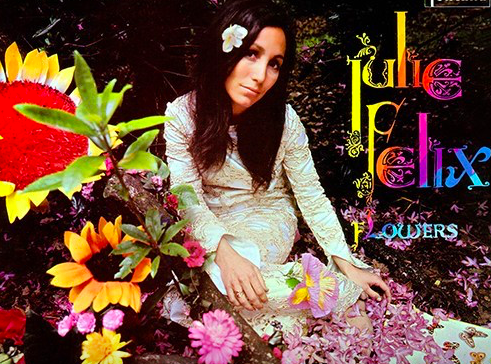
In an ideal world, we all hope to leave the world a better place, to make a difference somehow, to have our life matter. Julie Felix, who died recently, aged 81, has left behind a legacy far greater than her half century career as a folk singer. But to dismiss her just as a protest singer of yesteryear would be to ignore her much larger contribution. The singer-songwriter was also a humanitarian and human rights activist, having been politicised in the 1960s and active in peace and environmental movements.
Born and raised in Santa Barbara, with Mexican, Welsh and Native American ancestry, her passion for music was instilled by her father, a Mexican mariachi ensemble musician who played guitar and accordion. While as a child she wanted to be a Catholic nun, as a teenager she started singing at beach parties and coffee bars, but with limited prospects she took inspiration Jack Kerouac’s ‘On The Road’, and with US$1,000 saved, she hitchhiked across Europe, and in 1962 on the bohemian island of Hydra met a poet who needed encouragement to turn his words into songs. That poet was a certain Leonard Cohen. With her guitar and a duffel bag Julie went onto the UK, where she was ‘discovered’ by David Frost, and after featuring on his satirical Report show (she sang with Cohen when he made his TV debut – if you get the chance, there’s a Youtube clip of her singing with Cohen ‘That’s No Way to Say Goodbye’ https://www.youtube.com/watch?v=f1EJ-ITAcEU), she got her own primetime show on BBC ‘Once More With Felix’ which included guests The Bee Gees, The Kinks, Fleetwood Mac, The Hollies and Spike Milligan. She become the first solo folk performer to sign with a major British record label. Despite her American accent, and even though she sang the songs of America’s Woody Guthrie, Bob Dylan, and Paul Simon, she was claimed as ‘Britain’s answer to Joan Baez’, a fellow American she was sometimes mistaken for.
She became a household name, TV star and Top Twenty recording artist, known for her engaging voice, charming manner and empathy for others. When she visited New Zealand in 1971 she sang at a mass protest of 27,000 against conscription for the Vietnam War, and one of her most performed songs was Dylan’s ‘Masters of War’, a song she said was more relevant over the years. She recorded a double album of Dylan’s songs, and was a contemporary and friend of many of the counter-culture key figures including Arlo Guthrie (‘This Land is Your Land’), Dusty Springfield, Paul McCartney, Cat Stevens, Jimmy Page, Tom Paxton and Leonard Cohen. Julie was one of McCartney’s girlfriends, and it is said he sang ‘Strawberry Fields Forever’ to her before it was first performed publicly. She didn’t live a wild rock n’ roll lifestyle, though was once arrested at Heathrow airport for possession of cannabis.
But she wasn’t just a singer of protest songs, she had a deep concern for the world, the environment, and its people, particularly those oppressed. As well as being a singer, social justice, human rights and peace were important to her, and she was involved in many initiatives, charities and humanitarian causes for women’s rights, refugees, and victims of oppression, including projects to end the military use of landmines in Third World countries, and as an ambassador in the Middle East and Africa for Christian Aid.
One of her most requested songs is ‘Deportee (Plane Wreck at Lost Gatos)’, about the mistreatment of migrant farmers. Many generations of children might not know that she is the person who sang the ‘Going to the Zoo’ song (https://www.youtube.com/watch?v=WgCiE_tiyQo).
I met Julie in the 1990s. She once said that music is like breathing to her, and she was grateful at being able to make music and share it with others.
She was still touring, recording and performing into this year, with an album released in 2018 of her own songs, and a schedule of concerts planned for 2020.She died on Sunday 22nd March, on the weekend when the UK went into lockdown.
Julie leaves a deep legacy not just musically but in her ideals and how she strived to make a difference. She was both a product of her time, and ahead of her time, in wanting to make the world a better place, and being prepared to speak up, particularly for those without a voice. In a divided world, she saw no divisions, only an unrealised global consciousness, that we are all one, all children of the universe.










































